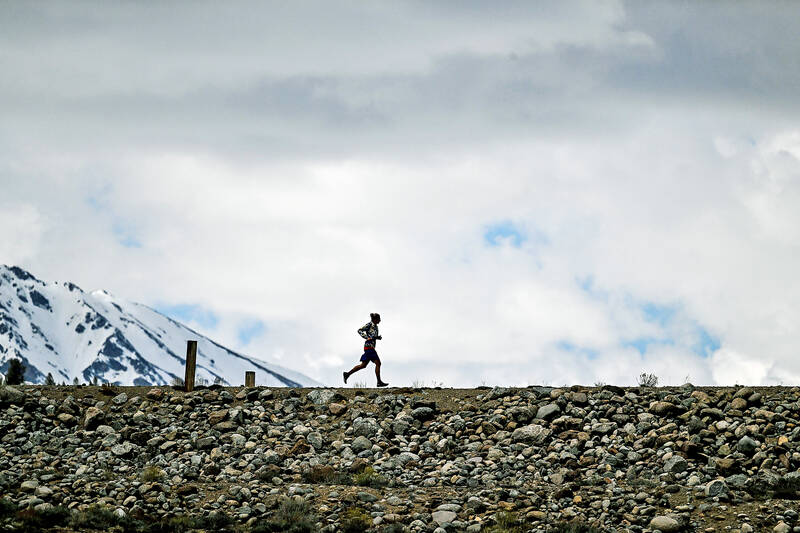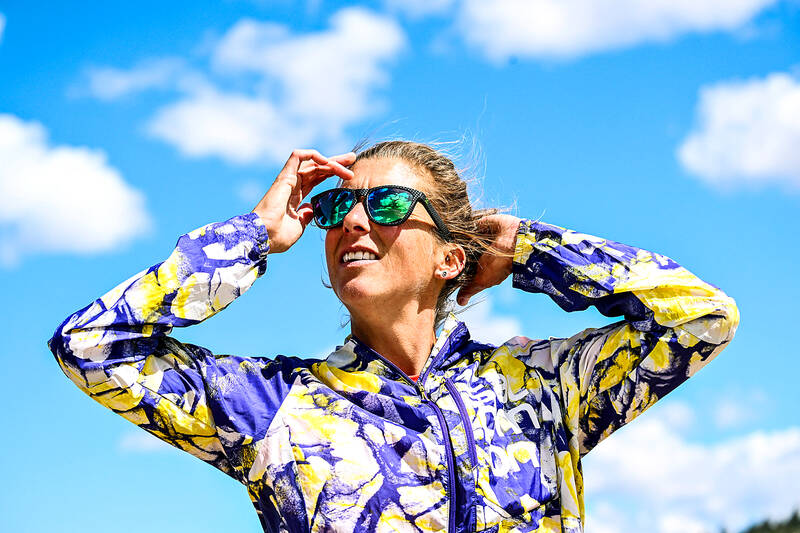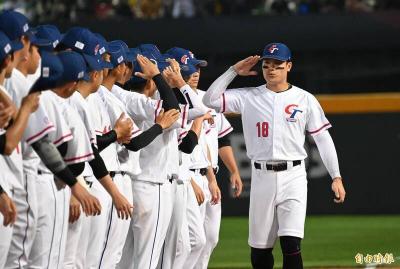Some time during a 322km race, maybe when she has been awake all night, ultra runner Courtney Dauwalter is likely to start hallucinating.
It could be a leopard in a hammock, a cowboy twirling a lasso, or hundreds of white kittens on the trail.
“I’ll make some friends out there,” she said, laughing.

Photo: AFP
Dauwalter sits at the apex of an elite group of ultra runners — people who run 80.5km, 161km or 322km in one go.
Wearing oversized shorts and a huge smile, she burst onto the scene about a decade ago, and was soon leaving competitors — including men — in her dust, knocking hours off course records, and always with boundless enthusiasm.
“I love it for so many reasons,” she said. “I love it for exploring. I love going somewhere you’ve never been, and running the trails there and not knowing what’s around the corner or what the summit will look like or how you’ll get there.”

Photo: AFP
Dauwalter is something of a contradiction: She is the best female ultra runner on the planet, and is worshiped in the extreme running community as something akin to superhuman, but she is nothing like an elite athlete is supposed to be.
She does not have a coach, does not follow a strict diet — she eats pizzas, burgers and candy — and wears baggy basketball-style shorts because they are comfortable.
Her training regime is dictated not by performance markers and down-to-the-millisecond metrics, but by how she feels when she wakes up.
“There’s no set plan, no schedule; that way I can see how my body feels, see how my brain feels, see where I’m at emotionally, and that’ll determine if I push, or have a more chill day,” Dauwalter said.
However, it works. The last few years have seen her notch wins in the women’s category in top-ranking races around the globe, including February’s 128km Transgrancanaria, which she completed in less than 15 hours.
She also holds the female record for the brutal Big Dog Backyard Ultra, a last-man-standing run in Tennessee, where there is no finish line, just an endless 6.7km loop every hour.
In 2020, Dauwalter completed it a staggering 68 times. She ran for almost three days in which she clocked more than 455km.
The winner’s purse is about US$1.60. Second place gets the dubious honor of having “Did Not Finish” written next to their name in the record book.
Now 38, Dauwalter’s success came relatively late.
She was in her mid-20s before she tried her first marathon.
“I was so scared that 26 miles [42km] would shatter my legs and I’d be a puddle on the side of the road, and so when I didn’t die, and my legs didn’t shatter, then it just made me wonder what else was out there,” she said.
That led to ultras.
“It blew my mind,” she said. “Everyone was just out there to have an adventure, and then you’d come up to these aid stations, and they’d have all these snacks, so we’re just filling our pockets with jelly beans, and I was like: ‘This sport is so cool.’”
In 2017, with a series of high-profile successes under her belt, Dauwalter gave up her teaching job, and began running professionally.
Sponsorship now allows her to jet around the globe, taking part in some of the world’s most prestigious ultramarathons in breathtakingly beautiful places.
As she breezes through the thin mountain air on snow-spattered trails around her home in Leadville, Colorado, Dauwalter keeps up a cheerful chatter that makes her running look easy. She insists it is not.
“I think ... it feels more like a roller coaster, where you don’t know exactly when those really hard moments are going to come,” she said. “You try to just kind of buckle in and ride it and wait for the low moments to pass and keep problem solving.”
Those problems can be as easy-to-fix as needing more calories, but if it gets really hard, she enters “the pain cave.”
“It’s this image that I’ve created in my brain of an actual cave, where I’ll go in with a chisel and work to make that cave bigger,” Dauwalter said. “Every time I race, I want to get there ... because it’s where the work actually happens.”
Ultra running is a rare sport in which men and women compete on a level playing field, especially at the really long distances.
For Dauwalter that is because running 322km is less about the size of your quads, or your lung capacity, and more about your ability to stay awake, maintain your focus or even just not throw up your food.
While to the outsider, the sport seems like an impossible physical feat, she said it is much more mental.
“What I’ve learned over the years of doing these is how strong our brains are and how, in those moments where our bodies want to tap out, our brains can actually help us continue pushing forward,” she said.

The qualifying round of the World Baseball Classic (WBC) is to be held at the Taipei Dome between Feb. 21 and 25, Major League Baseball (MLB) announced today. Taiwan’s group also includes Spain, Nicaragua and South Africa, with two of the four teams advancing onto the 2026 WBC. Taiwan, currently ranked second in the world in the World Baseball Softball Confederation rankings, are favorites to come out of the group, the MLB said in an article announcing the matchups. Last year, Taiwan finished in a five-way tie in their group with two wins and two losses, but finished last on tiebreakers after giving

North Korea’s FIFA Under-17 Women’s World Cup-winning team on Saturday received a heroes’ welcome back in the capital, Pyongyang, with hundreds of people on the streets to celebrate their success. They had defeated Spain on penalties after a 1-1 draw in the U17 World Cup final in the Dominican Republic on Nov. 3. It was the second global title in two months for secretive North Korea — largely closed off to the outside world; they also lifted the FIFA U20 Women’s World Cup in September. Officials and players’ families gathered at Pyongyang International Airport to wave flowers and North Korea flags as the

For King Faisal, a 20-year-old winger from Ghana, the invitation to move to Brazil to play soccer “was a dream.” “I believed when I came here, it would help me change the life of my family and many other people,” he said in Sao Paulo. For the past year and a half, he has been playing on the under-20s squad for Sao Paulo FC, one of South America’s most prominent clubs. He and a small number of other Africans are tearing across pitches in a country known as the biggest producer and exporter of soccer stars in the world, from Pele to Neymar. For

Coco Gauff of the US on Friday defeated top-ranked Aryna Sabalenka 7-6 (7/4), 6-3 to set up a showdown with Olympic champion Zheng Qinwen in the final of the WTA Finals, while in the doubles, Taiwan’s Chan Hao-ching was eliminated. Gauff generated six break points to Belarusian Sabalenka’s four and built on early momentum in the opening set’s tiebreak that she carried through to the second set. She is the youngest player at 20 to make the final at the WTA Finals since Denmark’s Caroline Wozniacki in 2010. Zheng earlier defeated Wimbledon champion Barbora Krejcikova of the Czech Republic 6-3, 7-5 to book